Machapuchare Nepal
Machapuchare
| Machhapuchare | |
|---|---|
| Machhapuchhre (Queen of the Mountains) | |

Machhapuchhare viewed from Tadapani.
|
|
| Highest point | |
| Elevation | 6,993 m (22,943 ft) |
| Prominence | 1,233 m (4,045 ft) |
| Coordinates | 28°29′42″N 83°56′57″ECoordinates: 28°29′42″N 83°56′57″E |
| Naming | |
| Native name | माछापुच्छ्रे |
| Translation | fish's tail |
| Geography | |
| Location | North Central Nepal |
| Parent range | Annapurna Himalayas |
| Climbing | |
| First ascent | Unclimbed (ascents not allowed) |
Early Morning View of Fishtail Mountain ( Machhapuchare), from Sarangkot
Contents
Location
Machapuchare is at the end of a long spur ridge, coming south out of the main backbone of the Annapurna Himalayas, which forms the eastern boundary of the Annapurna Sanctuary. The Sanctuary is a favorite trekking destination, and the site of the base camps for the South Face of Annapurna and for numerous smaller objectives. The peak is about 25 km (16 mi) north of Pokhara, the main town of the region.Notable features
Due to its southern position in the range, and the particularly low terrain that lies south of the Annapurna Himalayas, Machapuchare commands tremendous vertical relief in a short horizontal distance. This, combined with its steep, pointed profile, make it a particularly striking peak, despite a lower elevation than some of its neighbors. Its double summit resembles the tail of a fish, hence the name meaning "fish's tail" in Nepalese. It is also nicknamed the "Matterhorn of Nepal".Climbing history
Machapuchare has never been climbed to its summit. The only attempt was in 1957 by a British team led by Lieutenant Colonel Jimmy Roberts. Climbers Wilfrid Noyce and A. D. M. Cox climbed to within 150 m (492 ft) of the summit via the north ridge, to an approximate altitude of 22,793 ft (6,947 m). They did not complete the ascent, as they had promised not to set foot on the actual summit.[1] Since then, the mountain has been declared sacred, and is now closed to climbers.Gallery
Sources
- Andy Fanshawe and Stephen Venables, Himalaya Alpine Style. Hodder and Stoughton, 1995.
- Wilfrid Noyce, Climbing the Fish's Tail, London, 1958
- Koichiro Ohmori, Over The Himalaya, Cloudcap Press/The Mountaineers, 1994.

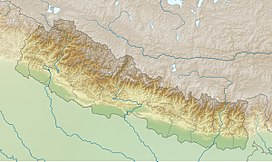

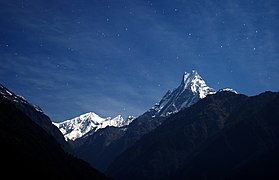

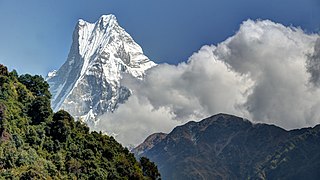
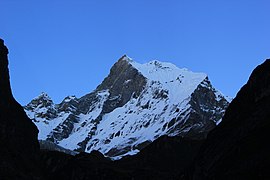
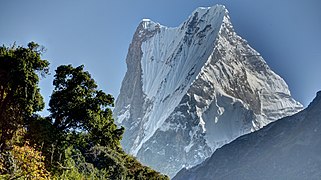




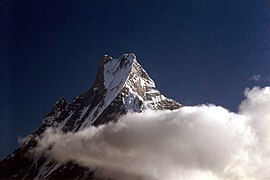

0 comments:
Post a Comment